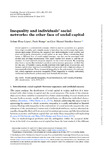Inequality and Individuals’ Social Networks: The Other Face of Social Capital

View/
Use this link to cite
http://hdl.handle.net/2183/28273
Except where otherwise noted, this item's license is described as Atribución-NoComercial 4.0 Internacional
Collections
- Investigación (FEE) [923]
Metadata
Show full item recordTitle
Inequality and Individuals’ Social Networks: The Other Face of Social CapitalDate
2021Citation
Atilano Pena-López, Paolo Rungo, José Manuel Sánchez-Santos, Inequality and individuals’ social networks: the other face of social capital, Cambridge Journal of Economics, Volume 45, Issue 4, July 2021, Pages 675–694, https://doi.org/10.1093/cje/beab016
Abstract
[Abstract] Social capital is a controversial concept, which is used in economics as a generic
form of pro-sociality and a simple means to introduce the social context into mainstream approaches. However, the accepted view underestimates social conflict and
does not properly characterise social capital as an asset. When considering these
issues, a different face of social capital emerges, one that can be associated with
closure and privilege maintenance. This paper studies how access to and the extraction of social network resources depend on the social structure. By analysing
data from a survey that included a position and a resource generator, we find that
for the case of Spanish society, people endowed with high levels of economic and
human capital enjoy improved accessibility and networks with a high prevalence of
instrumental relations. There is essential inequality in the endowment of social capital, which augments economic inequality. When inequality is socially embedded,
traditional redistributive policies may have limited effectiveness.
Keywords
Social capital
Inequality
Social stratification
Lin’s model
Bourdieu
Inequality
Social stratification
Lin’s model
Bourdieu
Description
Financiado para publicación en acceso aberto: Universidade da Coruña/CISUG
Editor version
Rights
Atribución-NoComercial 4.0 Internacional
ISSN
1464-3545






